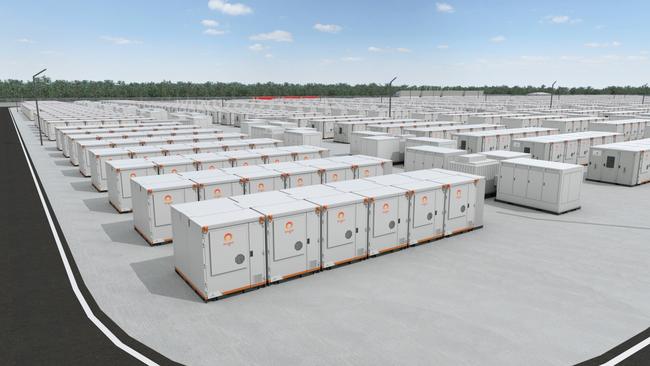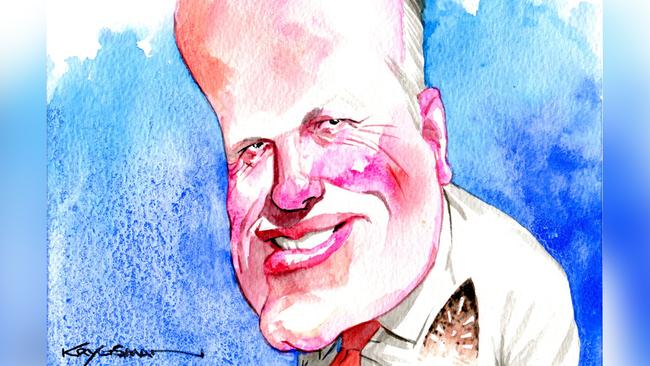
The key question then is how much more Brookfield is prepared to pay to win control of Australia’s best energy transition play.
At the outset it should be noted ACCC clearance would be fundamentally dumb, based on the unenforceable promise to keep the ACCC informed of plans to spend $25bn on renewable energy investments.
Expert evidence from Frontier Economics’ Matt Harris makes clear there is no shortage of capital backing the renewable transition, where transmission blockages and other issues were more the holdup.
Brookfield is not exactly promising to spend the money, just to let the ACCC know when it does – and in any case, once in control how does the regulator make sure the money is actually spent on renewable transition?
Question then what value Brookfield’s proposed money brings to the table.
The investment fund and its foreign investors are interested in Origin to make a dollar for themselves, and as the fund made clear in its own submission, it tends to clear assets every 12 years or so.
As an aside, Brookfield tacitly admits to the ACCC’s competition concerns by promising, when it does sell Origin, it will “ensure that following Brookfield Renewables’ sale of its interest in Origin Energy Markets, AusNet and Origin Energy Markets are not controlled by a single corporate group”.
As the ACCC thinks there may be competition concerns, which means it can’t clear the deal, just where the regulator finds public benefit in an up to 12-year asset trade on behalf of Brookfield’s foreign investors beggars belief.
Next Tuesday’s decision will not include enforcement chief Liza Carver who has recused herself due to past involvement with the parties.
Origin shareholders, AustralianSuper and Perpetual, have made clear they will reject the $8.91-a-share deal which raises the question just how much Brookfield’s Stewart Upson will lift his offer to get approval and by how much.
ACCC clearance is the first step, then there is issue of pesky public company shareholders who think, based on market multiples, Upson is effectively stealing the company.
Origin says 2024 earnings before interest tax depreciation and amortisation will be $1.5bn, which compares with the average over the last decade of $1.4bn, and Upson says he will pay 13 times earnings.
Origin is the best energy transition story in the market with 4.4 million customers, gas peakers to back up supply at 3000 megawatts, Eraring at 2880 megawatts, development sites and plenty of strategic sites for batteries.
Over the last three years transition deals have included Alinta-Pilbara at 12.9 times, Infigen at 14 times, CWP at 20 times and Meridian at 30 times.
Since Origin’s Frank Calabria agreed to accept $9 a share, energy markets have recovered, Ukraine-inspired energy prices rises have subsided, the Octopus investment makes Calabria look like a deadset genius given its growth rate and APLNG looks better thanks to continued strong global oil and LNG prices.
Origin acquired 20 per cent of Octopus in 2021 at $1.4bn but its stake is worth more like $3bn, energy is worth closer to $19.4bn and, APLNG which spins off 80 per cent of its cash to shareholders, against the Santos equivalent at 16 per cent and Woodside at 34 per cent, puts its value at $10.2bn.
That is an equity value of $29.7bn, or $17.20 a share, which is close to double the price on the table.
An increased bid will come if Upson still wants Origin, the question is how much more.
Who do you trust?
The US antitrust case against Google search dominance is big news everywhere it seems but Canberra, because the federal government – after testing potential responses in March – is still to act on last year’s ACCC report on potential enforcement action against the big digital platforms.
The ACCC wants to have the power to designate platforms, which will then be subjected to conformance with an industry code aimed at offsetting the limits of litigation in dealing with the behemoths.
Last week the ACCC handed the government its next report, on platform ecosystems, detailing the extent of their walled gardens.
This by-law must be released in the next month but, as shown by the now 12 months and ticking since the enforcement report was received, there is unfortunately no time limit on actual decisions on the recommendations.
If Treasurer Jim Chalmers can’t get around to regulating Google, Apple, Amazon, Microsoft et al, what chance of enforcing controls on artificial intelligence breaching copyright and destroying the value of original content?
CSL investor disquiet
Given his stellar record, CSL chair Brian McNamee is understandably still bemused when shareholders question his deal judgment, most recently the 2022 $US11.7bn takeover of Switzerland-based Vifor Pharma.
The iron deficiency and kidney specialist is what UBS analysts call a “black box” – as in, they are not sure how it works.
UBS tips earnings this year of $US1.76bn for the vehicle out of total gross earnings of $US8.4bn on $US2.5bn in revenues out of $US14.6bn.
Of some concern is star product Ferinject which comes off patent this year, which means more competition.
Investor concern ahead of next week’s annual meeting is focused on the pay deal for former boss Paul Perreault, who formally stepped down on September 6.

The remuneration report details a novel treatment of his unvested shares which will exclude the Vifor impact on earnings per share.
With no accompanying changes to the hurdles, this makes it more likely the shares will vest.
Some proxy advisers are recommending shareholders vote against the remuneration report based on this exclusion.
Investors figure if they have to put up with earnings dilution from the deal then so should Perreault.
This will be one of the questions asked at what promises to be a tense meeting, and just for good measure Melbourne Uni protesters will reportedly use the event to express their concerns at board member and uni vice chancellor Duncan Maskell’s university $1.5 million salary.
Caroline Hewson is the only director up for re-election.
Timely pension application
SuperEd’s Jeremy Duffield is campaigning for people to know the aged pension for a couple is worth $1.2m up to 92 years of age and more if you live longer.
When getting retirement advice the pension is sometimes the forgotten ingredient, as shown by the fact that only 44 per cent of eligible people apply for a pension on time, 32 per cent do it 12 months late and 16 per cent three years late.
There is no back pay available.
SuperEd works with nine of the top 20 super funds to help advise members on how to access the age pension and work it into their financial plan.




If the talk is right, the ACCC next Tuesday will clear the $18.7bn Brookfield bid for Origin which, assuming FIRB clearance, will leave the decision on the underpriced bid in shareholder hands.